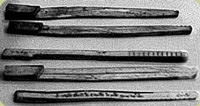|
|||
The Unholy AllianceLarry LaBorde Earlier this month in Nashua, New Hampshire congressman Ron Paul said that, "1913 was a bad year. We need to repeal that entire year." The crowd cheered him. Well what exactly happened in 1913? Two very important events took place in the United States that year. The first was in February when the 16th amendment was declared passed and income tax began. (see thelawthatneverwas.com) The second event occurred in December of that same year when congress authorized another Federal Bank in the form of the Federal Reserve Bank. (President Andrew Jackson had killed the previous federally chartered 2nd National Bank by refusing to renew its charter in 1836. He claimed it was the greatest accomplishment of his life. Two years later in 1838 he paid off the national debt entirely.) How are these two acts related? Going back in history we find Lincoln was hard pressed for funds to pursue his invasion of the Southern States. He simply issued paper notes directly from the US treasury called greenbacks. These notes were payable in gold without interest at some unspecified date in the future. He then used these same notes to pay troops and purchase supplies. They were declared legal tender and circulated along side regular gold backed currency. They were good for all debts EXCEPT for payment of taxes to the government. For that Lincoln wanted gold backed notes. Even though the greenbacks were legal tender they were discounted against the gold backed notes. Eventually they were redeemed at full value a couple of decades after they were issued. So if a country can directly issue bonds why can't it issue notes (currency)? Why do we need a private bank (the federal reserve) to issue them for us? Thomas Edison stated that a country that can issue bonds can also issue notes or currency. Both are promises to pay but one fattens the bankers and the other helps the people. As a matter of fact the US Treasury issued silver certificates directly with the government silver backing it up as a government issued note or currency until 1963 when the federal reserve started printing small notes. Why does the government print bonds and sell them to the privately owned federal reserve bank in exchange for currency (notes) and pay interest on those bonds to a private bank when it could just issue the notes (currency) themselves without having to pay any interest at all?
Now just think for a minute. If the government can fund their operations by issuing bonds (or currency) why do they need to collect taxes? It is the very fact that those taxes are collected in unbacked worthless paper federal reserve notes that give them their value. Without the income tax, fiat money issued by the federal reserve would not have value. The private federal reserve notes are given value due to their enforcement arm, the US Treasury collection agents who will knock on your door, take you away to jail by force of arms and confiscate your lands or assets if you do not pay your income tax with them. It is no coincidence that both were passed in the same year. In 1924 shortly before his death, President Wilson said in regards to the federal reserve, "I have unwittingly ruined my country." In our current little liquidity crisis the nasty secret of the federal reserve and fractional reserve banking comes into play. When the US Treasury sells a one dollar bond to the federal reserve, the federal reserve gives the US Treasury a one dollar note (that costs the federal reserve nothing). The federal reserve then charges interest on the note. After the US Treasury spends the dollar into circulation and it ends up at a private bank it gets even better. The private bank can send the single dollar to the federal reserve bank and place it on deposit there and then borrow 9 dollars from the federal reserve (that it creates out of thin air) to loan out in commercial loans. So with a 10% bank reserve for every one dollar the US Treasury borrows and spends into circulation 9 dollars get created out of thin air in commercial banks in conjunction with the federal reserve bank. When one dollar of currency is pulled out of the system the money in circulation decreases by 9 dollars. When the 10% reserve requirement is lowered it gets even crazier. Is there any wonder than panics can cause liquidity crisis with our present system. Top it all off with Wall Street's new leveraging tricks and the multiplier effect is staggering during a contraction. No wonder the federal reserve has to flood the market with money to keep up with a contraction. The entire system is flawed because of greed. Do you ever wonder where the interest comes from to pay on all the money that was created out of thin air? And what is the true rate of return on a note that didn't cost the federal reserve bank anything in the first place? Infinity! While other presidential candidates are hacking at the branches only one has the sense to strike at the root. The more you learn about Dr. Ron Paul the more you will like him. I wonder if he is related to Andrew Jackson? Opt out of a dishonest system and save in silver and gold. You can either trust the banksters or 5,000 years of history with your savings. Aug 23, 2007 |


